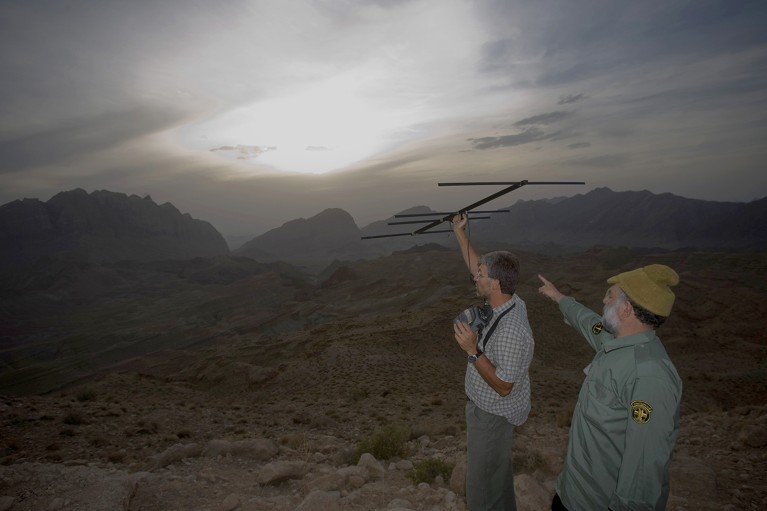[ad_1]

Conservationist Houman Jokar (pictured left in 2008) working with a government official using an antenna to scan leopards’ radio collars.Credit: Caren Firouz/Reuters
Four members of a conservation group focused on big cats who were jailed in Iran six years ago were pardoned on 7 April as part of a mass amnesty of prisoners ahead of Eid holidays at the end of the fasting month of Ramadan.
The group includes Niloufar Bayani, a conservation scientist and former consultant with the United Nations Environment Programme (UNEP) and biologist Houman Jokar, who were both released yesterday. The other two, released today are ecologist Taher Ghadirian and Sepideh Kashani, an administrator with the Persian Wildlife Heritage Foundation (PWHF), a non-governmental organization (NGO) in Tehran. All four were arrested in January 2018 alongside five other conservationists; none of the nine now remains in prison.
“I am incredibly happy for them. We have all greatly suffered from the injustice that was done to us,” says Morad Tahbaz, a businessman and conservationist with US-British–Iranian citizenship who was one of the nine but was released last September as part of a US–Iranian prisoner swap. UNEP also welcomed the release in a statement.
Bayani wrote letters to government officials and members of the judiciary from Tehran’s Evin prison, revealing how incarcerated people were being subjected to isolation, exhausting interrogations, torture and threats of rape.
“Currently, groups of activists working in climate-related issues are under extreme pressure. The conviction of our environmental NGO and the fate of its employees and founders is one example of how environmental work has become a political crime,” she wrote.
Six years behind bars
The nine, all members of the PWHF, were arrested by the Islamic Revolutionary Guards Corps, a military organization that is part of the Iranian state. The director of PWHF, Canadian–Iranian citizen Kavous Seyed-Emami, a sociologist, died in prison weeks after the arrest in circumstances that have not been independently verified.
Starting in November 2019, a revolutionary court sentenced the remaining eight to prison terms of between four and ten years, for espionage.
At the time of the arrest, the group was carrying out research on species including the endangered Asiatic cheetah (Acinonyx jubatus venaticus) and Persian leopard (Panthera pardus tulliana) in national parks and elsewhere.
Seven of the conservationists remained in Iran after last year’s prisoner swap, and three of those were subsequently released after serving shorter sentences.
The detentions sparked a worldwide campaign by conservation organizations advocating their release. Iran’s president at the time, Hassan Rouhani, established an inquiry that concluded in May 2018 that there was no evidence supporting the charges. However, the prison sentence was still handed down, and was then upheld by a revolutionary court in February 2020.
The release is “very good news. But nothing can restore the lost years of life and the loss of Emami,” says Kaveh Madani, director of the UN University Institute for Water, Environment and Health in Richmond Hill, Canada. Madani was deputy head of Iran’s Department of Environment when he, too, was arrested and interrogated in 2018 as part of the same operation that sent the environmentalists to jail. He was able to flee the country.
Research in prison
During her incarceration, Bayani managed to complete a research project. She interviewed 25 female political prisoners incarcerated for opposing Iranian government policies, and researched how climate change is perceived in an oil and gas producing state.
“Being confined for over 4 years in one place, a small square piece of land on the planet has gradually shifted my point of view,” she wrote in a report called ‘Climate Literacy in the Land of Oil’. Bayani began teaching a course on climate change, which led to an open letter from the prisoners calling on their government to take stronger action on climate change.
“I used to think through maps, satellite photos and Geographic Information Systems (GIS) modelling, as if my desk was constantly soaring above the Earth,” she continued. “From a satellite view, it is easy to imagine a united human population that is concerned about its common future, but when you land, as I have on this small parcel, the reality is very different.”
[ad_2]
Source Article Link

